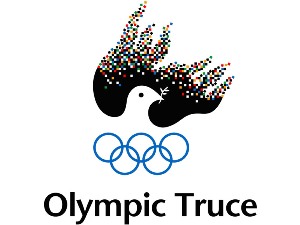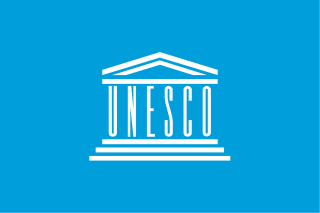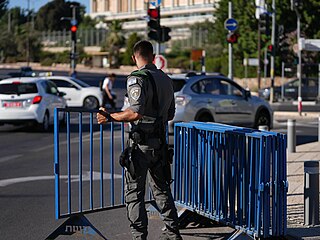
Kofi Atta Annan was a Ghanaian diplomat who served as the seventh secretary-general of the United Nations from 1997 to 2006. Annan and the UN were the co-recipients of the 2001 Nobel Peace Prize. He was the founder and chairman of the Kofi Annan Foundation, as well as chairman of The Elders, an international organisation founded by Nelson Mandela.

The United Nations (UN) is a diplomatic and political international organization whose stated purposes are to maintain international peace and security, develop friendly relations among nations, achieve international cooperation, and serve as a centre for harmonizing the actions of nations. It is the world's largest international organization. The UN is headquartered in New York City, and the UN has other offices in Geneva, Nairobi, Vienna, and The Hague, where the International Court of Justice is headquartered at the Peace Palace.

The United Nations General Assembly is one of the six principal organs of the United Nations (UN), serving as its main deliberative, policymaking, and representative organ. Currently in its 78th session, its powers, composition, functions, and procedures are set out in Chapter IV of the United Nations Charter.

The Rome Statute of the International Criminal Court is the treaty that established the International Criminal Court (ICC). It was adopted at a diplomatic conference in Rome, Italy on 17 July 1998 and it entered into force on 1 July 2002. As of February 2024, 124 states are party to the statute. Among other things, it establishes court function, jurisdiction and structure.

The United Nations System consists of the United Nations' six principal bodies, the Specialized Agencies and related organizations. The UN System includes subsidiary bodies such as the separately administered funds and programmes, research and training institutes, and other subsidiary entities. Some of these organizations predate the founding of the United Nations in 1945 and were inherited after the dissolution of the League of Nations.

The Inter-Parliamentary Union is an international organization of national parliaments. Its primary purpose is to promote democratic governance, accountability, and cooperation among its members; other initiatives include advancing gender parity among legislatures, empowering youth participation in politics, and sustainable development.

Palestine, officially known as the State of Palestine, is a country in the Levant region of West Asia. It is officially recognized as a state by the United Nations and numerous countries. Palestine shares borders with Israel to the east and north, Jordan to the east, and Egypt to the southwest. The state comprises the West Bank, including East Jerusalem, and the Gaza Strip. Population of Palestine exceeds five million people, and covers an area of 6,020 square kilometres (2,320 sq mi). Jerusalem is its proclaimed capital and the official language is Arabic. Majority of Palestinians practice Islam, while Christianity also has a significant presence.

United Nations General Assembly Resolution 3379, adopted on 10 November 1975, "Determines that Zionism is a form of racism and racial discrimination" with 72 votes in favour, 35 votes against, and 32 abstentions. It was revoked by Resolution 46/86, adopted on 16 December 1991 with 111 votes in favour, 25 votes against, and 13 abstentions. The vote for Resolution 3379 was held nearly one year after the adoption of Resolution 3236 and Resolution 3237: the former recognized the "Question of Palestine" and invited the Palestine Liberation Organization (PLO) to participate in international diplomacy; and the latter designated the PLO as a non-member Assembly observer following the "Olive Branch Speech" by Palestinian political leader Yasser Arafat.
The United Nations General Assembly has granted observer status to international organizations, entities, and non-member states, to enable them to participate in the work of the United Nations General Assembly, though with limitations. The General Assembly determines the privileges it will grant to each observer, beyond those laid down in a 1986 Conference on treaties between states and international organizations. Exceptionally, the European Union (EU) was in 2011 granted the right to speak in debates, to submit proposals and amendments, the right of reply, to raise points of order and to circulate documents, etc. As of May 2011, the EU is the only international organization to hold these enhanced rights, which has been likened to the rights of full membership, short of the right to vote.

The International Day of Peace, also officially known as World Peace Day, is a United Nations-sanctioned holiday observed annually on 21 September. It is dedicated to world peace, and specifically the absence of war and violence, such as might be occasioned by a temporary ceasefire in a combat zone for humanitarian aid access. The day was first established in 1981 and first observed in September 1982 and is kept by many nations, political groups, military groups, and people.
The United Nations Division for Palestinian Rights (UNDPR) is a part of the Department of Political Affairs of the United Nations Secretariat.

Vuk Jeremić is a Serbian politician and diplomat who served as the president of the United Nations General Assembly from 2012 to 2013 and as the Minister of Foreign Affairs of Serbia from 2007 to 2012.

The Olympic Truce is a tradition originating from ancient Greece that dates back to 776 BC. A "truce" was announced before and during the Olympic Games to ensure the host city state (Elis) was not attacked and athletes and spectators could travel safely to the Games and peacefully return to their respective countries.

The United Nations Educational, Scientific and Cultural Organization (UNESCO) is a specialized agency of the United Nations (UN) with the aim of promoting world peace and security through international cooperation in education, arts, sciences and culture. It has 194 member states and 12 associate members, as well as partners in the non-governmental, intergovernmental and private sector. Headquartered in Paris, France, UNESCO has 53 regional field offices and 199 national commissions.
In December 2009, the United Nations General Assembly adopted resolution 64/134 proclaiming the year commencing 12 August 2010 as the International Year of Youth.
The official languages of the United Nations are the six languages used in United Nations (UN) meetings and in which the UN writes all its official documents.

The United Nations General Assembly Resolution 43/177 of 15 December 1988 was a resolution in which the United Nations General Assembly acknowledged the proclamation of the State of Palestine and the use of the designation "Palestine", referring to the PLO in the UN. Further, the Assembly affirmed the need for sovereignty by the Palestinian people over their territory occupied in 1967 by Israel. The resolution is titled "43/177. Question of Palestine".
United Nations General Assembly resolution 67/19 is a resolution upgrading Palestine to non-member observer state status in the United Nations General Assembly. It was adopted by the sixty-seventh session of the United Nations General Assembly on 29 November 2012, the date of the International Day of Solidarity with the Palestinian People and the 65th anniversary of the adoption by the General Assembly of resolution 181(II) on the Future Government of Palestine. The draft resolution was proposed by Palestine's representative at the United Nations. It, however, maintains the status of the Palestinian Liberation Organization as the representative of the Palestinian people within the United Nations system. Though strongly contested by the United States and the government of Israel, former Israeli Prime Minister Ehud Olmert expressed support for the measure. The motion was seen as largely symbolic, though it could allow Palestine to start proceedings at the International Criminal Court against Israel. Its timing, following a year in which Palestine obtained membership of UNESCO and the UN Security Council was unable "to make a unanimous recommendation" on their application for full UN membership, and coming several days after the completion of Operation Pillar of Defense, was also noted. The new status equates Palestine with that of the Holy See within the United Nations system and implicitly recognises Palestinian sovereignty.
International Year of Volunteers was designated for 2001 by the United Nations General Assembly. The initiative aimed at increased recognition, facilitation, networking and promotion of volunteering, to highlight the achievements of the millions of volunteers worldwide who devote their time to serving others, and to encourage more people globally to engage in volunteering.
United Nations General Assembly Resolution 48/144 of 20 December 1993 is a resolution in which the General Assembly expressed its concern at the ongoing degradation of the humanitarian situation in Azerbaijan because of the displacement of considerable number of citizens due to Nagorno Karabakh conflict and supporting "emergency international assistance to refugees and displaced persons in Azerbaijan". The resolution is titled “48/114. Emergency international assistance to refugees and displaced persons in Azerbaijan”. It became the fifth United Nations document concerning Nagorno-Karabakh and the first United Nations General Assembly document on humanitarian aid to those affected by this conflict. This resolution was the first international document affirming the number of refugees and displaced persons in Azerbaijan exceeded one million. The document does not make any specific reference to previous UN resolutions on the ongoing conflict, but "its relevant resolutions regarding humanitarian assistance to refugees and displaced persons". The resolution was adopted by consensus without voting.













